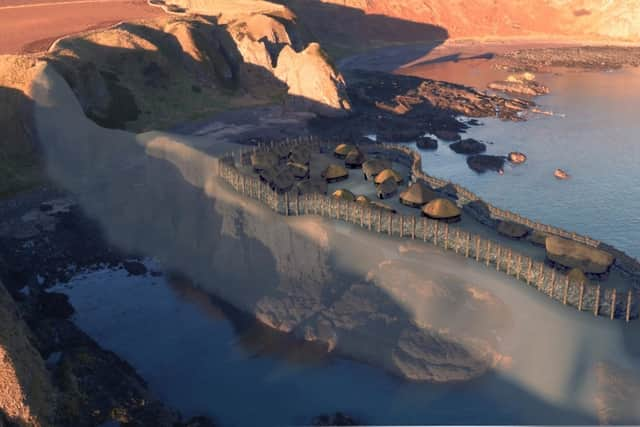Archaeologists re-writing the history of the Picts are honoured
Pioneering work led by Aberdeen University has radically altered understanding of the people who lived in the north and east of Scotland between roughly 300 and 800AD.
The Picts have long been regarded in popular culture as a wild warrior tribe of painted people, with their iconic carved stones among the limited hard evidence remaining of the people and their culture.
Advertisement
Hide AdAdvertisement
Hide AdBut excavations carried out by the Northern Picts project since 2012 have shown the Picts to have been a much more sophisticated society than previously understood with evidence of trade across Europe and the creation of large, hierarchical settlements.


Among discoveries made are a massive hilltop settlement, where up to 800 huts may have been in use, and the oldest known Pictish fort, which has helped to extend the timeline of the Picts by hundreds of years.
‘The problem of the Picts: searching for a lost people in northern Scotland’ has now been named Research Project of the Year for 2021 by influential magazine Current Archaeology.
Professor Gordon Noble, head of archaeology at Aberdeen University, said: “It was a great honour to be nominated, let alone win. Our project has been about trying to put the Picts on the archaeological map, and winning this award is testament to the fact that we have succeeded to some extent. But there’s much we can do in the coming years to ensure that progress continues.
“Since we began our work on northern Picts in 2012, we have uncovered ever-increasing evidence of Pictish society through large-scale excavations of the scale hitherto rarely undertaken. These have begun to underline the importance of northern Pictland and north-east Scotland to the establishment of the first kingdoms of Scotland.
“For too long this period of Scotland’s history has been a particularly poorly illuminated part of the so-called Dark Ages. Our work is shedding new light on this and engaging people in new ways with our Pictish past."
Since 2012, the research team led by Professor Gordon Noble has been building a very different picture of the early societies of northern Britain given the name 'Picti' - meaning 'Painted Ones' - by the Romans, to that traditionally presented in popular accounts.
At Tap o’ Noth, an imposing hill which rises above the village of Rhynie to the north of Aberdeen, the team made their most spectacular find yet.
Advertisement
Hide AdAdvertisement
Hide AdIn 2020, using radiocarbon dating and aerial photography, they uncovered evidence which indicates that thousands of people may have lived in more than 800 huts perched close to the summit, rivalling the largest known post-Roman settlements in Britain and Ireland.
In the valley below, archaeologists found evidence for the drinking of Mediterranean wine, the use of glass vessels from western France and intensive metalwork production at a site at Barflat farm, just to the south of the village. The finds suggest it was a high-status site, possibly even with royal connections.
At the precarious Dunnicaer sea stack close to the Dunnottar Castle near Stonehaven, archaeologists identified remains of the oldest Pictish fort ever discovered, dating back as far as the third or fourth centuries, with implications for the dating of the Pictish symbol stones found there.